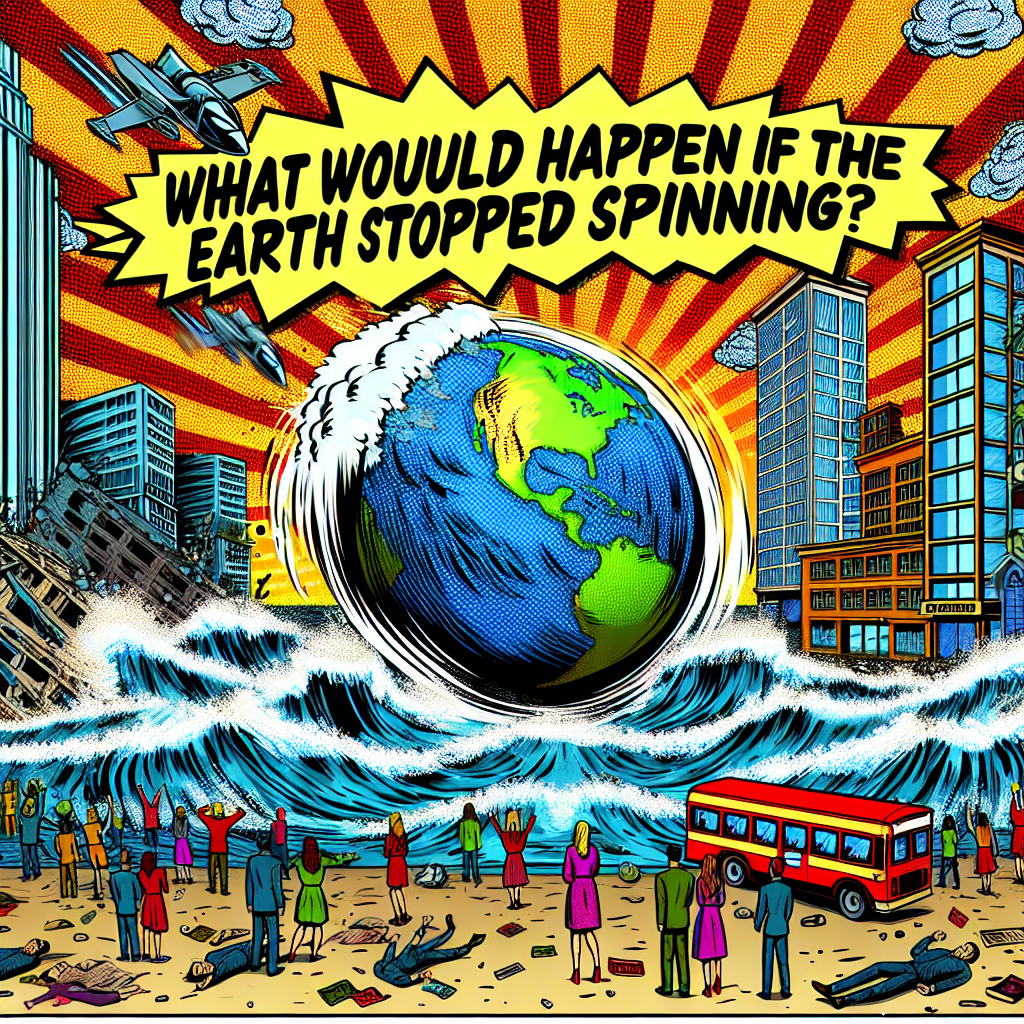The Earth's spin is what gives us day and night, but what if it suddenly stopped spinning? Imagine you're on a merry-go-round that's come to a sudden halt. You'd feel a jolt, right? That's kind of what would happen to our planet.
First, let's talk about the atmosphere. The air we breathe is stuck to the Earth because of gravity. If the Earth stopped spinning, the atmosphere would still be moving at the same velocity it was when the planet was rotating. This means that winds would be ridiculously strong, like a never-ending hurricane. Imagine holding onto a lamppost while a tornado rages around you!
The atmosphere would also slosh around, creating massive storms and tidal waves. It would be like a giant game of spin the Earth, but instead of a gentle twirl, it would be a violent shake. The laws of physics would ensure that the atmosphere keeps moving, but in a chaotic, uncontrolled way.
Now, let's talk about the oceans. Our planet's rotation helps create the ocean currents and tides. If the Earth stopped spinning, these currents would grind to a halt. Imagine a giant, stagnant bathtub – that's what our oceans would become. Marine life would struggle to survive, and the ocean's chemistry would be severely disrupted.
Temperature differences between the equator and the poles would become extreme. The equator would be scorching hot, while the poles would be freezing cold. This would lead to extreme weather patterns, making it difficult for life to thrive. Imagine wearing a pair of sunglasses in Antarctica – that's how extreme the temperature differences would be!
Gravity would still be at work, but it would be affected by the lack of centrifugal force. The Earth's equator would start to bulge inward, making the planet slightly more spherical in shape. It would be like a partially deflated basketball, with the equator being the "dent" in the ball.
The planet's magnetic field, which protects us from harmful solar radiation, would also be affected. The magnetic field is generated by the movement of molten iron in the Earth's core. Without the spin, the core would slow down, and our magnetic shield would weaken. This would leave us vulnerable to harmful radiation from the Sun and deep space.
Let's not forget about the stars and the night sky. With the Earth's spin, we see a different set of stars every night. If the Earth stopped spinning, we'd be stuck looking at the same starry pattern forever. It would be like being stuck on a never-ending elevator ride, with the same view every time the doors open.
Plant life would suffer greatly. Many plants rely on the daily cycle of sunlight and darkness to regulate their growth. Without the spin, they'd be stuck in a perpetual state of confusion. Imagine a plant that's constantly trying to grow, but can't figure out when to photosynthesize or rest!
The Earth's rotation also plays a crucial role in the planet's plate tectonics. The spinning motion helps drive the movement of tectonic plates, which in turn creates mountains, volcanoes, and earthquakes. Without the spin, plate tectonics would slow down, and geological activity would decrease. It would be like a giant, geological engine sputtering to a halt.
In conclusion, if the Earth stopped spinning, our planet would become a very different, and hostile, place. The consequences would be far-reaching, affecting everything from the atmosphere to the tiniest microorganisms. So, let's be grateful for our planet's spin, and the many wonders it brings us every day!
The Sun would still rise and set, but it would do so in a very different way. Imagine a giant, slow-motion sunrise that takes months to complete. The Sun would appear to move in a straight line, rather than arcing across the sky.
The lack of spin would also affect the planet's geological cycles. The Earth's core would slow down, which would reduce the planet's internal heat budget. This would lead to a decrease in volcanic activity, and a slower rate of geological change. It would be like a giant, geological clock winding down.
In the end, a spinless Earth would be a desolate, barren place. The planet's ecosystems would collapse, and life as we know it would cease to exist. So, let's appreciate the beauty and complexity of our spinning planet, and do our best to protect it for future generations.

Popular Space Questions
Find answers to the trending space questions being asked by our community on social media.
- How many galaxies are there in the universe?
- How far is Pluto from Earth?
- How many planets are in the Milky Way?
- How many planets are in our solar system?
- How big is the Earth?
- What would happen if a rogue planet entered our solar system?
- What are the planets in order?
- What if we found a way to manipulate gravity?
- What would happen if a pulsar's beam hit Earth?
- What would happen if a quasar aimed its jet at Earth?